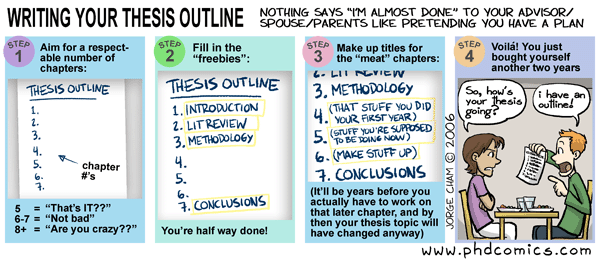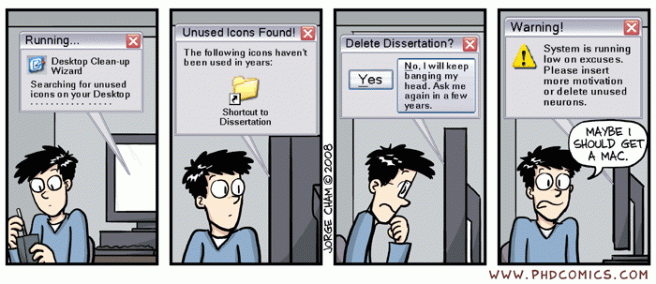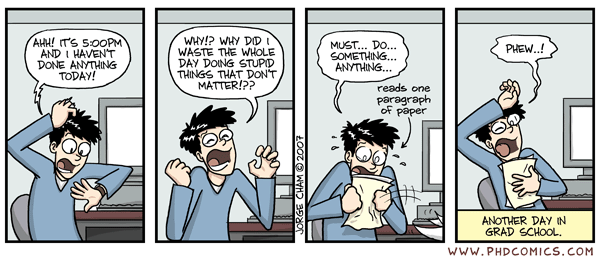The mammoth is actively contemplating — perhaps a bit too much!– but as you can see, this blog has been a little neglected since I started my faculty position last fall. I’ve got a nice series of posts lined up, but to kick things off again, here’s a great contribution from my friend, colleague, and fellow Badger, Hannah. For those of you in the home stretch of #phd2014 (and beyond!), this has some fantastic advice. – JG
The most challenging chapter of my graduate school career was finding my way as a dissertator. In the grand scheme of things, I realize that this is a pretty insignificant challenge, but a challenge none the less. And at this point in my “career”, it was my main struggle. I am a very list-oriented, deadline-focused individual who thrives on structure. As a dissertator, the structure that had been imposed on me by class schedules and weekly assignments suddenly disappeared. I no longer had outside forces dictating my weekly routine. And my next deadline was my defense which was still 2 ½ years away. With wide open days and no classes, I had “too much” time. To many, this might sound like a fantastic situation to be in, but to me, it was overwhelming. With all of this new time on my hands, shouldn’t I be cranking out my dissertation?
I credit my breakthrough in the “getting shit done” realm with two experiences. The first was a fitness class I took with a friend. As part of this class, we were required to write up a fitness plan each week and follow up with our instructor when we accomplished each of our fitness goals. It’s easy for exercise to fall off the to-do list when life gets hectic or the weather gets cold, but creating a weekly plan and having to report back to an instructor provided the outside pressure I needed to follow through with my weekly plans. And since these were weekly plans, the goals had to be concrete and accomplishable. Maybe the long-term goal was to run a marathon, but the weekly goals were small steps towards the big goal. The long-term goal was overwhelming, but the weekly goals were not. As the class progressed, I realized that this was exactly the formula I needed to apply to my dissertation.
The second experience was reading a book my advisor gave me called Switch: How to Change Things When Change Is Hard. The central premise of the book involves the idea that our brain has two parts, a rationale side and an emotional side. The emotional side is like an elephant and the rationale side is like the rider on the elephant. In order to get anything done, you have to direct the rider, motivate the elephant, and know your destination. If you don’t know your destination or the steps you need to take to get there, you won’t get anywhere. And even the most determined rider will not get anywhere if the elephant won’t budge. Luckily, once you identify which part of the equation is missing, finding the solution becomes easier. This book made me realize that I definitely had an elephant problem, but also a rider problem. I needed to direct the rider by clearly outlining the steps to my destination (i.e. a finished dissertation). I quickly discovered that my elephant is easily bribed with immediate gratification, positive incentives, and a swift kick in the butt.
So, here is my advice to you on how to direct the rider and overcome the elephant.
1. Create structure.
Sign up for a weekly extracurricular activity like yoga, karate, or underwater basket weaving. Getting something concrete on your calendar will help start the ball rolling in structuring the rest of your week. It will also give you something to look forward to each week. Schedule weekly or monthly meetings with your advisor for the whole semester. This will give you some specific deadlines to work with.
2. Make a plan.
Sketch out a long-term plan for the semester. What are the big goals you want to accomplish? (This is a good time to think about the positive incentives you will treat yourself with for accomplishing your goals. Like that new bag you’ve been wanting or dinner at a nice restaurant). Now break it down by month. Know that this plan will change as you progress through the semester and that’s ok. Revisit the long-term plan throughout the semester and adjust as needed. Each Friday, make a weekly plan for the following week. Include dissertation goals, non-dissertation work goals, and personal goals in your plan. You have a life outside of graduate school, so acknowledge it and make time for your personal goals. If you are super detail oriented, go ahead and assign each specific goal to a specific time and day. If you are like me and hate Mondays, having a plan will help you be productive on the worst day of the week. And if you are like me and hate mornings, having a plan will help you get out of bed.
3. Get some accountability.
Recruit some friends to help you stay accountable to your plan. Set up a recurring weekly meeting with your friends or fellow dissertators. Each week, go around the table and state your goals for the week and what you got done the previous week. If you didn’t achieve your goals for the previous week, talk about what you will do to get your goals done this week. Maybe your goals were too big or not specific enough. Maybe you forgot some steps you needed to take before you could accomplish your goals. Set up a weekly writing group. This will provide structure and accountability. Reserve a conference room or choose a meeting location where you can meet each week. Turn off your wifi, silence your cell phone, and get writing. Having someone to suffer along with you makes writing easier.
4. Find your place.
Figure out where you are most productive. Do you like the hustle and bustle of a coffee shop or the silence of the library? Do you work well at your office or at home? Some types of work might be more conducive to different environments. Maybe you need silence to write but activity to work on your statistics. Finding the right music can also be extremely helpful. Create a “Git er dun” playlist on your computer or iPod. Do you like lyrics or instrumental? Classical or heavy metal? Again, different types of work may require different types of music.
5. Give yourself some easy victories.
Remember that sometimes it’s ok if you just have to clean the house or mow the lawn to give your elephant an easy victory before you can get to work for the day. Completing a small, measurable task like doing the dishes or folding the laundry can be extremely satisfying and help get the elephant moving. Productive procrastination is a great morale booster for unmotivated elephants.
And finally, know that you are not alone in this endeavor and that a lot of work has to happen before you can actually write. Being a dissertator can feel very isolating. Forming an accountability club and a writing group will help break this isolation. Find out if your university has a writing center and take advantage of the services they offer. Talking through your work with someone unfamiliar with your dissertation can be very helpful. And remember that writing is important, but you can’t write if you don’t know your story. Clarify your research questions, objectives, methods, analyze your data, and draw your figures. Once you know your story, writing will be much easier.
Recommended Reading
If reading a whole book seems overwhelming, try reading for just one hour per day. You’ll be amazed how many books you can read over the course of the semester in just one hour per day.
Switch: How to Change Things When Change Is Hard by Dan and Chip Heath
How to Write a Lot by Paul J. Silvia
Writing Science: How to Write Papers That Get Cited and Proposals That Get Funded by Joshua Schimel
Categories: Grad School Guest Posts Professional Development Tips & Tricks



Awesome Hannah! Advice taken.
LikeLike